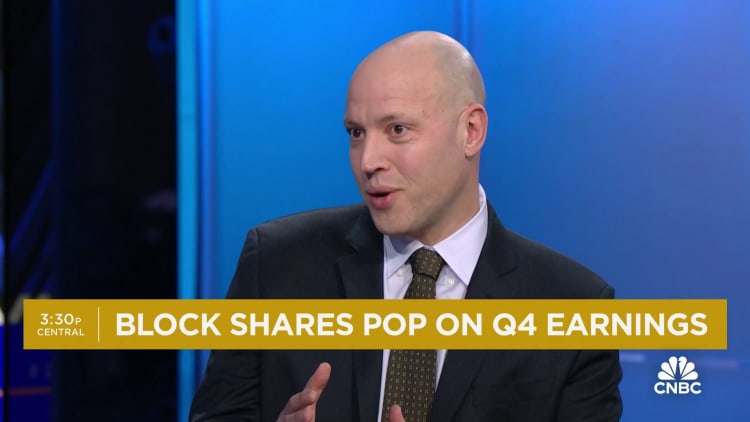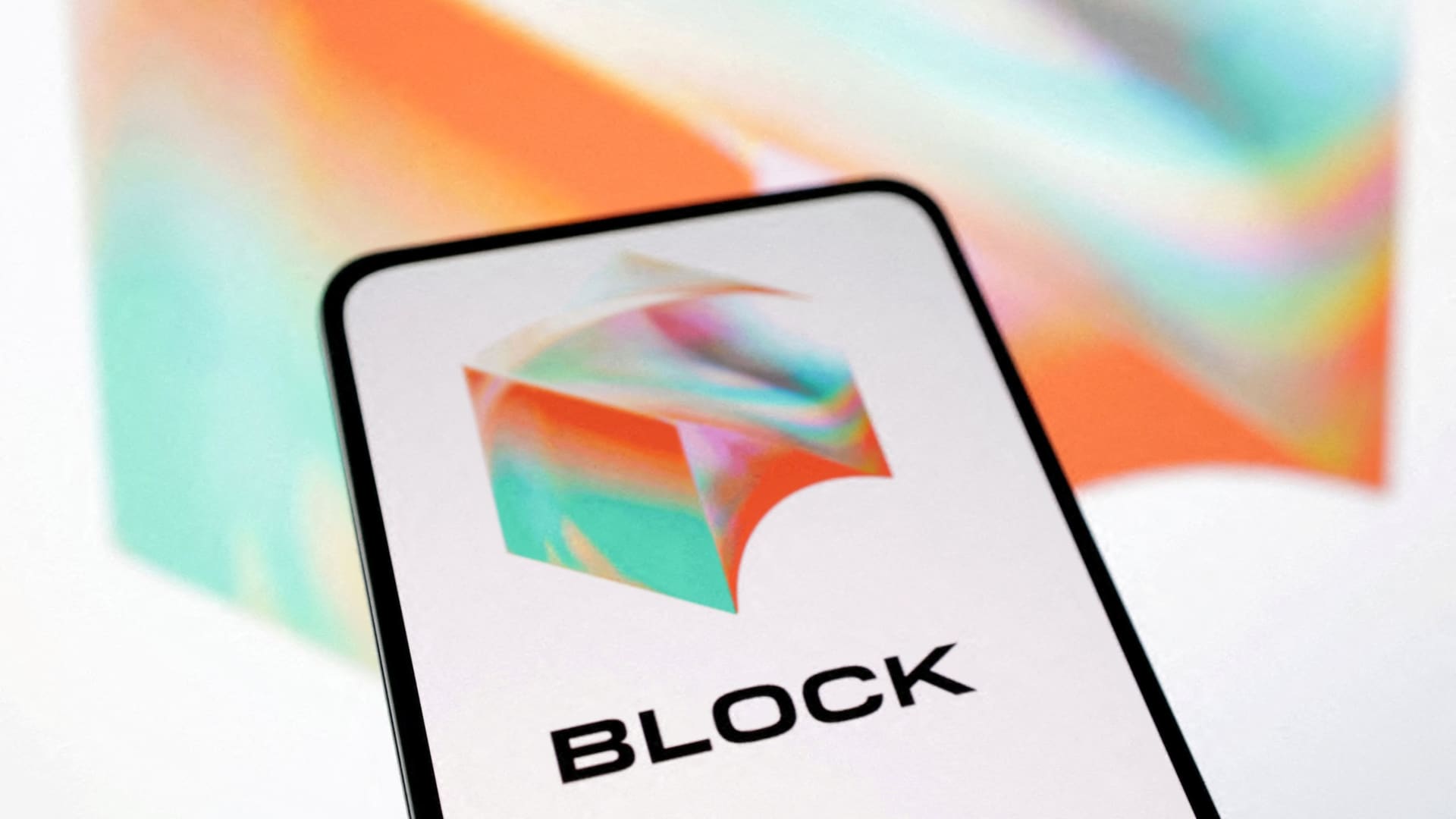Block reported first-quarter earnings after the bell that exceeded analysts’ estimates. The stock rose about 10% in extended trading.
Here’s how the company did, compared to analysts’ consensus from LSEG.
- Earnings per share: 85 cents adjusted vs. 72 cents adjusted that was expected
- Revenue: $5.97 billion vs. $5.82 billion expected
Block posted $2.09 billion in gross profit, up 22% from a year ago. Analysts tend to focus on gross profit as a more accurate measurement of the company’s core transactional businesses.
The company reported net income of $472 million, or 74 cents per share, more than quadruple the net income of $98.3 million, or 16 cent per share, a year earlier.
The company raised its adjusted EBITDA forecast for the second quarter to $690 million from $670 million.
Block, formerly known as Square, ended the year with 57 million monthly transacting actives for Cash App in March, up 6% year-over-year. Inflows per transacting active were $1,255, up 11% year over year.
The Cash App business, which is the company’s popular mobile payment platform, reported $1.26 billion in gross profit, a 25% year-over-year jump. Block, run by Twitter co-founder Jack Dorsey, said its Cash App Card monthly active users increased to 24 million in March.
Block is also more focused on integrating Afterpay, the buy-now, pay-later company it bought for $29 billion in 2021. Afterpay struggled following the deal, posting big losses.
Block has slimmed down operations in recent months. In January, Dorsey reportedly said in a note to staffers that the company had laid off a “large number” of workers. This followed another round of layoffs in December.
Chief financial officer Amrita Ahuja said in a call with CNBC that the company is raising its outlook for the year to reflect its strong performance in the first quarter.
Dorsey’s note to shareholders began by directly addressing a question that he often fields: “Why the hell are you all spending so much time on bitcoin?”
“Less than 3% of company resources are dedicated to bitcoin-related projects,” Dorsey wrote. “But why spend time on bitcoin at all? We believe the world needs an open protocol for money, one that’s not owned or controlled by any single entity.”
Bitcoin, said bitcoin will ultimately help Block “serve more people around the world faster.” He added that going forward, Block will be investing 10% of its gross profit from bitcoin products into purchases of bitcoin for investment.
“We were one of the first public companies to put bitcoin on our balance sheet,” he wrote.
The $220 million the company invested into bitcoin has grown 160% to $573 million as of the end of the first quarter, according to Dorsey.
Federal probe into Block
Cash App remains a significant contributor to overall profitability at the company.
The Block CFO told CNBC that the fintech firm has seen “continued resilience of spend” with not only growth in actives, but also growth in spend per monthly active user on a year-over-year and quarter-over-quarter basis.
“Which shows us again, continued resilience of this customer base and strong engagement with our product,” said Ahuja.
Shares in Block dropped 8% percent on Wednesday after an NBC investigation claimed that U.S. prosecutors were probing the company’s compliance practices based on information leaked to them by a former employee of the company.
“Most of the transactions discussed with prosecutors, involving credit card transactions, dollar transfers and bitcoin, were not reported to the government as required,” the NBC story alleged.
The whistleblower reportedly gave the government materials showing breaches in know-your-customer and anti-money laundering rules, as well as evidence indicating that management ignored these lapses.
Unlike past reports of possible wrongdoing at the company, the latest allegations encompass both Cash App and the company’s Square point-of-sale technology. It also includes within its scope international payments, sanctioned nations, and breaches of the Office of Foreign Assets Control. In September, Alyssa Henry stepped down as Square CEO. Dorsey stepped in to fill the role and no successor has been announced.
A separate report in February published by the same NBC reporter found that two whistleblowers had gone to the U.S. Treasury’s Financial Crimes Enforcement Network, or FinCEN, to share similar allegations. The popular payment app “had no effective procedure” to establish the identity of its customers, two whistleblowers told officials, according to NBC.
Analysts for Macquarie wrote in a note on Wednesday that should the Federal probe find merit in these claims, they see greater potential for fines or behavioral remedies such as robust oversight teams and infrastructure rather than “something structural like limitations on the types of business it can do.”
Last year, short seller Hindenburg Research levied similar claims, alleging that Block allowed criminal activity to operate with lax controls and “highly” inflates Cash App’s transacting user base, a key metric of performance.
Hindenburg described Block’s internal systems as a “‘Wild West’ approach to compliance.”
— CNBC’s Michael Bloom and Kate Rooney contributed to this report.
WATCH: Block shares pop on earnings beat








